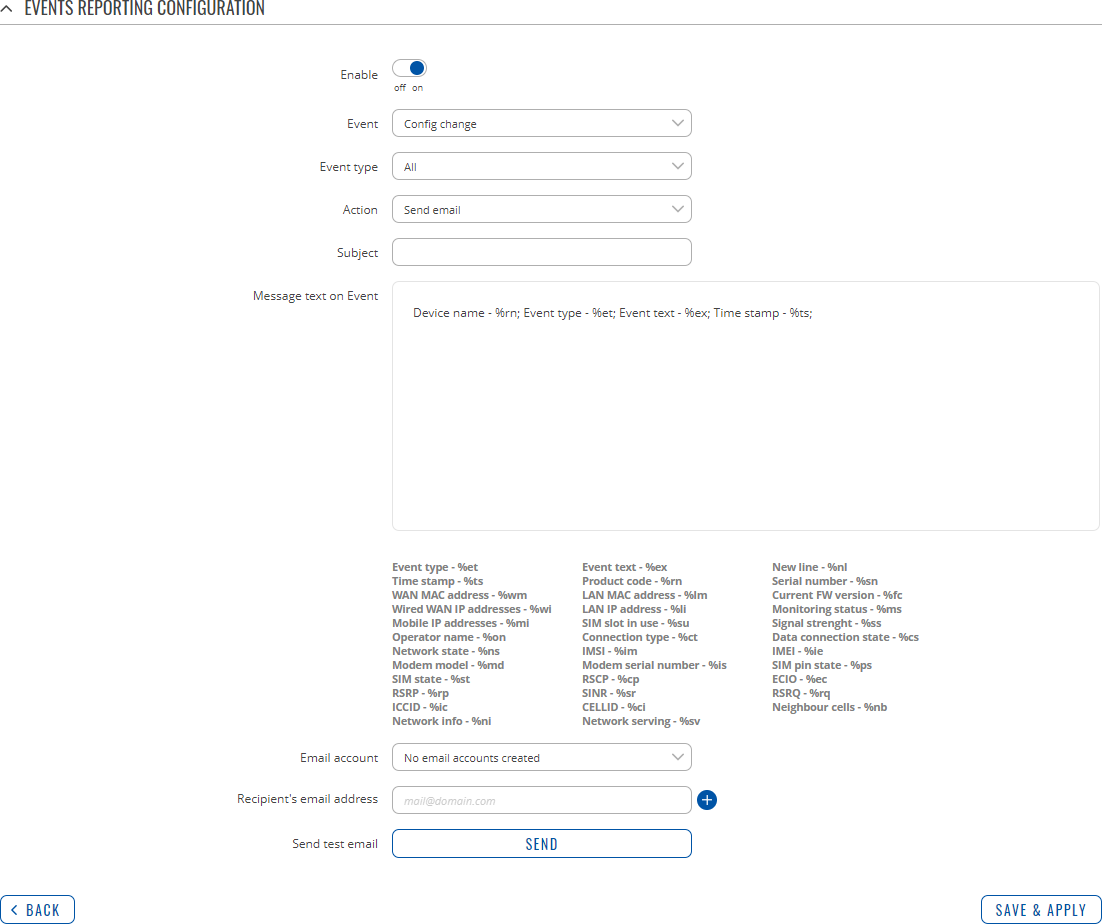Template:Networking rutos manual events reporting: Difference between revisions
Gytispieze (talk | contribs) No edit summary |
No edit summary |
||
| Line 4: | Line 4: | ||
| series = {{{series}}} | | series = {{{series}}} | ||
}} | }} | ||
{{#ifeq: {{{series}}} | RUT9 |<br><i><b>Note</b>: <b>[[{{{name}}} Events Log (legacy WebUI)|click here]]</b> for the old style WebUI (FW version RUT9XX_R_00.06.08.3 and earlier) user manual page.</i>|}} | |||
==Summary== | ==Summary== | ||
Revision as of 14:06, 19 July 2021
Template:Networking rutos manual fw disclosure
Summary
The Events Reporting feature provides the possibility to configure rules that inform via SMS or email when certain trigger events occur.
This page is an overview of the Events Reporting section for {{{name}}} devices.
Events Reporting Rules
The Events Reporting Rules section is used to manage existing Events Reporting rules and to add new ones. Events Reporting Rules trigger on certain, user specified events and send an SMS message or email to a specified number informing of the occurred event.
All possible trigger events are listed in the table below.
| Event | Description |
|---|---|
| Config change | Informs on changes to the device's configuration. Possible triggers are:
|
| New DHCP client | Informs on new DHCP lease give outs. Possible triggers are:
|
| Reboot | Informs after device reboot occurrences. Possible triggers are:
|
| SSH | Informs on successful or unsuccessful SSH login attempts. Possible triggers are:
|
| WebUI | Informs on successful or unsuccessful HTTP/HTTPS login attempts. Possible triggers are:
|
Events Reporting Configuration
The Events Reporting Rules list is empty by default. Before you can begin configuration you must add at least one new rule. This can be done by clicking the 'Add' button:
After adding a rule you should be redirected to its configuration page.
Send email
When an Events Reporting rule is configured to send emails, the device (this {{{name}}}) will connect to an existing email account when a user specified trigger event occurs and send an email to another email address informing of the occurred event.
In order to send emails, the device requires access to an existing email account. You can configure email accounts in the System → Administration → [[{{{name}}} Administration#Recipients|Recipients]] page. Allowing access to less secure apps may be required for some email service providers.
| Field | Value | Description |
|---|---|---|
| Enable | off | on; default: on | Turns the rule on or off. |
| Event | Config change | New DHCP client | Reboot | SSH | WebUI ; default: Config change | The event that you wish to receive notifications on. |
| Event type | Varies | Specific event sub-type that will trigger the rule. The value of this field changes in accordance with the selection of the 'Event' field. |
| Action | Send email; default: Send email | Selects the method of reporting on the specified event. |
| Subject | string; default: none | Subject of the sent email. |
| Message text on Event | string; default: Router name - %rn; Event type - %et; Event text - %ex; Time stamp - %ts; | Text to be included in the body of the report email. |
| Email account | email account; default: none | The account that will be used to send an email. |
| Recipient's email address | email address; default: none | Email address of the recipient. |
| Send test email | - (interactive button) | Sends an email based on the current configuration. This is used to test whether the configuration works as intended. |
[[Category:{{{name}}} Services section]]


